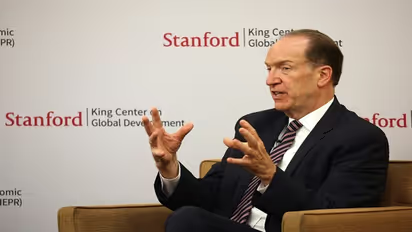World Bank President David Malpass lauds India, says its support to poor during COVID-19 remarkable

Synopsis
Malpass in the forward to the report said the rise in poverty in poorer countries reflects economies that are more informal, social protection systems that are weaker, and financial systems that are less developed. Yet several developing economies achieved notable successes during COVID-19, PTI reported.
World Bank President David Malpass on Wednesday hailed India and said that India's support to the poor and needy during the COVID-19 pandemic crisis is remarkable, and other nations should adopt India’s move of targeted cash transfer instead of broad subsidies.
In a release by the World Bank, it said that COVID-19 marked the end of a phase of global progress in poverty reduction. "During the three decades that preceded its arrival, more than 1 billion people escaped extreme poverty. The incomes of the poorest nations gained ground, Malpass said in the forward to a study," the release said.
According to reports, the poorest people bore the steepest costs of the pandemic — income losses averaged four per cent for the poorest 40 per cent, double the losses of the wealthiest 20 percent of the income distribution.
Malpass in the forward to the report said the rise in poverty in poorer countries reflects economies that are more informal, social protection systems that are weaker, and financial systems that are less developed. Yet several developing economies achieved notable successes during COVID-19, PTI reported.
Also read: PDP chief Mehbooba Mufti says she is under house arrest; Srinagar Police deny claims
"Helped by digital cash transfers, India managed to provide food or cash support to a remarkable 85 percent of rural households and 69 per cent of urban households. South Africa initiated its biggest expansion of the social safety net in a generation, spending USD 6 billion on poverty relief that benefited nearly 29 million people," Malpass said.
In 2020, despite an economic contraction, Brazil managed to reduce extreme poverty, primarily using a family-based digital cash-transfer system.
Also read: PDP chief Mehbooba Mufti says she is under house arrest; Srinagar Police deny claims
"In short, fiscal policy — prudently used and considering the initial country conditions in terms of fiscal space — does offer opportunities for policymakers in developing economies to step up the fight against poverty and inequality. To realise the potential of fiscal measures, the report calls for action on three fronts," Malpass said.
"Targeted cash transfers are a far more effective mechanism for supporting poor and vulnerable groups: more than 60 percent of spending on cash transfers goes to the bottom 40 per cent. Cash transfers also have a larger impact on income growth than subsidies," Malpass wrote.
With this, it can be seen that COVID-19 has underlined how progress achieved over decades can suddenly vanish. "High-return investments in education and infrastructure projects should be made now. Governments need to improve their preparation for the next crisis," he added.
(With inputs fromPTI)
Check the Breaking News Today and Latest News from across India and around the world. Stay updated with the latest World News and global developments from politics to economy and current affairs. Get in-depth coverage of China News, Europe News, Pakistan News, and South Asia News, along with top headlines from the UK and US. Follow expert analysis, international trends, and breaking updates from around the globe. Download the Asianet News Official App from the Android Play Store and iPhone App Store for accurate and timely news updates anytime, anywhere.